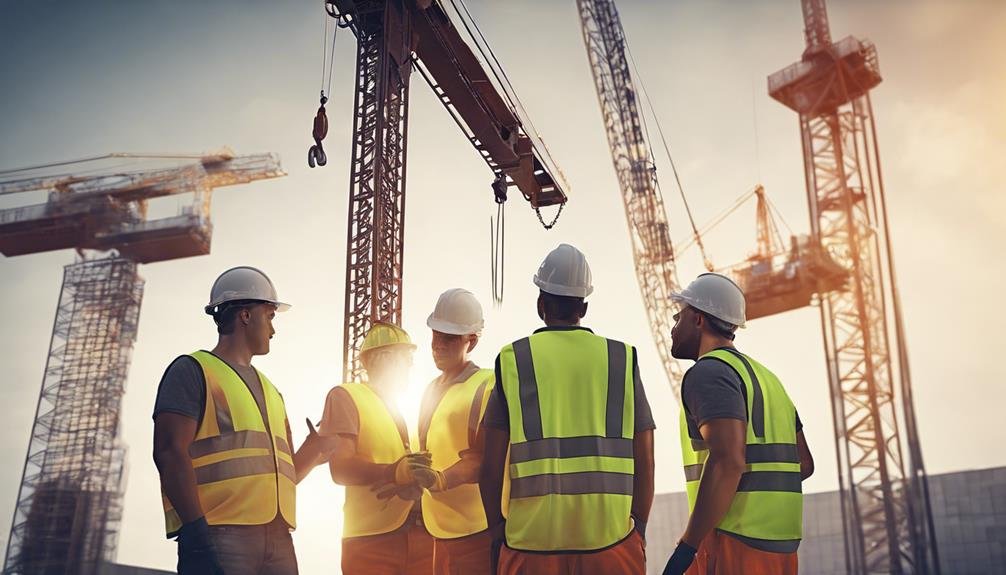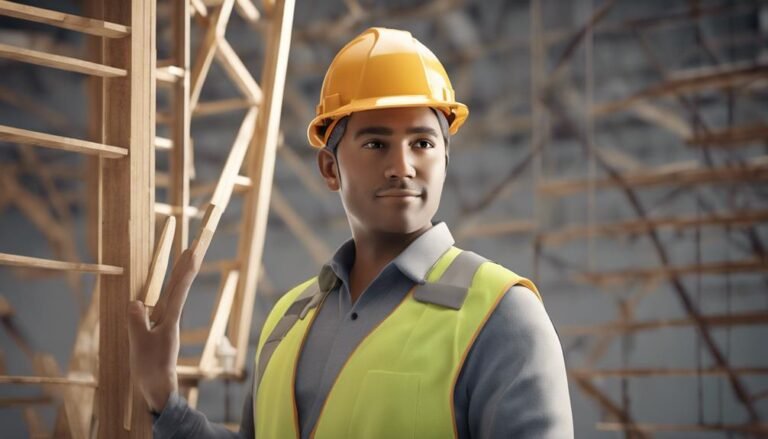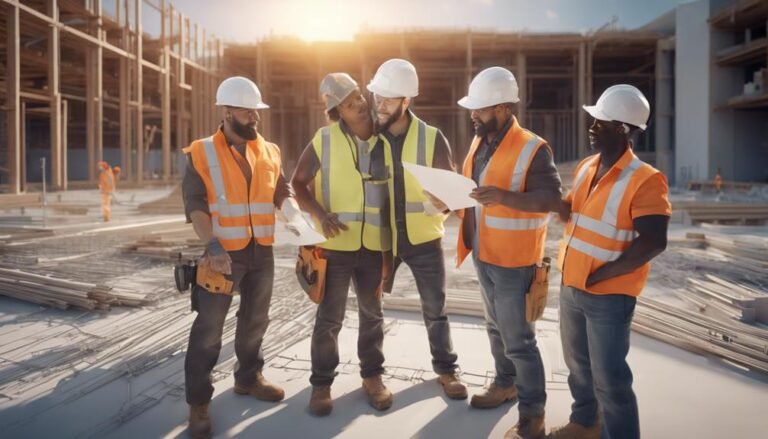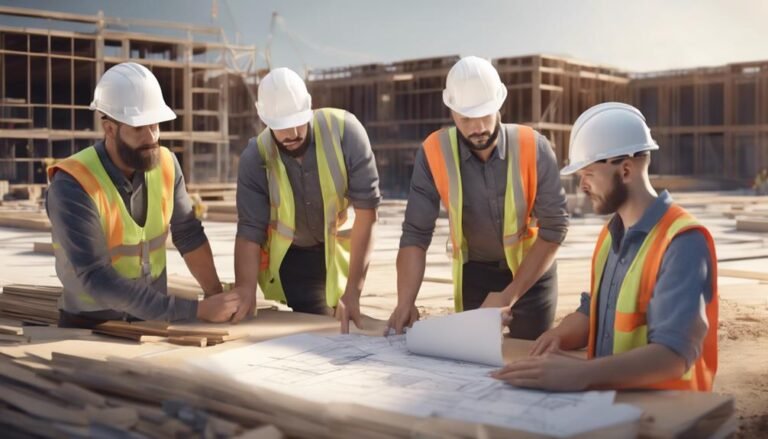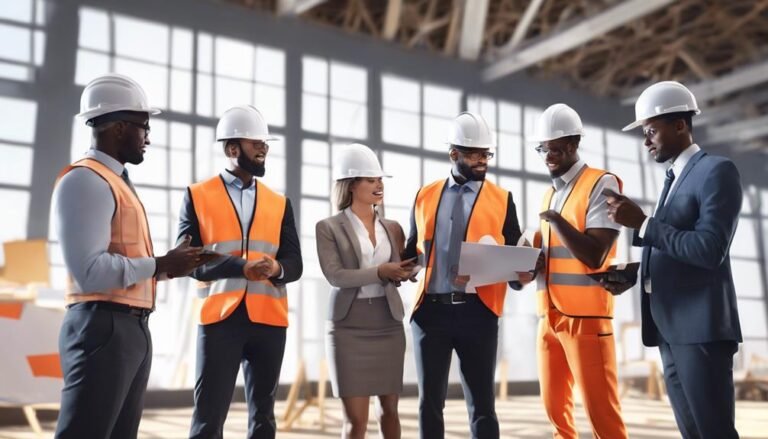Building High-Performing Teams in Construction
To build high-performing construction teams, focus on fostering collaboration and effective communication. Encourage trust, unity, and mutual reliance among team members. Use tools like BIM and project management software for efficient teamwork. Develop a positive team culture with shared values and open dialogue. Invest in training for skill enhancement and team growth. Evaluate performance through feedback and accountability measures. By prioritizing these strategies, you can optimize productivity and quality in construction projects. For more insights on enhancing team performance and achieving success, explore the holistic approach outlined in the research.
Key Takeaways
- Foster collaboration and trust among team members for enhanced productivity.
- Utilize effective communication strategies to ensure clarity and transparency.
- Implement collaboration tools like BIM and project management software.
- Develop a positive team culture with shared values and open communication.
- Focus on training, skill development, and continuous learning for team success.
Importance of Team Building
Team building is essential for fostering collaboration and enhancing productivity within construction projects. Effective team bonding creates a sense of unity among members, encouraging them to work towards a common goal. Through team bonding activities such as team-building exercises or social gatherings, trust building is facilitated, promoting stronger relationships among team members. When trust is established, individuals feel more comfortable sharing ideas, asking for help, and collaborating on tasks.
Trust building is important in construction projects where teamwork is essential for success. By engaging in activities that require communication, problem-solving, and decision-making, team members learn to rely on each other's strengths and expertise. This mutual reliance fosters trust and respect within the team, leading to improved efficiency and higher quality work. Team building also helps to identify each member's strengths and weaknesses, allowing for better task allocation and smoother project execution.
Effective Communication Strategies
To optimize collaboration and productivity within construction projects, establishing effective communication strategies is vital. Active listening plays a critical role in ensuring that all team members feel heard and understood. Encouraging individuals to engage in active listening fosters a culture of respect and openness, leading to smoother project workflows.
In addition to active listening, providing clear feedback is essential for effective communication within construction teams. Constructive feedback helps team members understand expectations, address any issues promptly, and make necessary adjustments to enhance performance. By offering specific and actionable feedback, you contribute to the overall improvement of the team's communication dynamics.
Moreover, promoting transparency in communication channels is key to avoiding misunderstandings and delays in construction projects. Clearly defining roles, responsibilities, and project timelines helps ensure that everyone is on the same page, reducing the likelihood of errors and rework. Implementing regular check-ins and progress updates further enhances communication efficacy, keeping the team informed and aligned towards common project goals.
Collaboration Tools and Techniques
Implementing advanced digital collaboration tools and leveraging proven techniques can greatly enhance coordination and efficiency within construction teams. When it comes to virtual collaboration, project management tools play a vital role in facilitating seamless communication and task tracking. Here are some essential collaboration tools and techniques that can elevate your team's performance:
| Tool/Technique | Description | Benefits |
|---|---|---|
| Building Information Modeling (BIM) | Enables virtual 3D modeling for project visualization and coordination | Improved project planning and reduced errors |
| Cloud-Based Project Management Software | Provides a centralized platform for real-time collaboration and document sharing | Enhanced team communication and productivity |
| Virtual Meeting Platforms | Facilitates remote team meetings and discussions | Saves time and increases accessibility |
Developing a Positive Team Culture
To foster a positive team culture in construction, you should emphasize shared values and goals among team members.
Encouraging a supportive team environment where everyone feels valued and respected is essential.
These elements lay the foundation for a cohesive and high-performing team.
Shared Values and Goals
Embracing and aligning shared values and goals within a construction team is essential for cultivating a cohesive and productive team culture. Team alignment and vision clarity are vital for ensuring that all team members are moving in the same direction.
By establishing shared purpose and common objectives, you create a unified front that fosters collaboration and efficiency. Clearly communicating these values and goals from the outset helps set expectations and provides a framework for decision-making.
When everyone is working towards a common goal, it promotes a sense of belonging and motivates individuals to perform at their best. Encouraging open dialogue and feedback mechanisms further reinforces the importance of these shared values and goals, ultimately leading to a high-performing construction team.
Supportive Team Environment
Aligning your construction team towards a supportive and positive team environment is imperative for fostering collaboration and maximizing productivity.
Trust building is a fundamental aspect of creating a supportive team environment. Encourage open communication, active listening, and transparency to establish trust among team members. Recognize individual strengths and contributions to reinforce a sense of value and mutual respect within the team.
Conflict resolution is another key component in maintaining a positive team culture. Address conflicts promptly and constructively, focusing on finding solutions that benefit the team as a whole. Implement fair and transparent processes for resolving disagreements to make certain that issues are handled effectively and don't escalate.
Training and Skill Development Initiatives
To guarantee your team's success, concentrate on implementing Skill Enhancement Programs, offering On-The-Job Training opportunities, and fostering Continuous Learning initiatives.
These initiatives will help your team members acquire new skills, enhance their existing ones, and stay updated with industry trends.
Skill Enhancement Programs
Skill enhancement programs in construction greatly boost team performance and efficiency through targeted training and skill development initiatives. Leadership development within these programs cultivates strong decision-making abilities and fosters a culture of accountability among team members. By honing leadership skills, individuals become better equipped to guide their teams towards successful project completion.
Team dynamics are another vital aspect addressed in these programs. Team-building exercises and communication workshops enhance collaboration, trust, and synergy among team members. Understanding how to navigate and leverage team dynamics effectively leads to smoother workflows and improved project outcomes.
Investing in skill enhancement programs not only elevates individual capabilities but also enhances the overall cohesion and effectiveness of construction teams.
On-The-Job Training
Enhancing team performance and efficiency through targeted on-the-job training and skill development initiatives is a strategic approach that directly impacts project outcomes in the construction industry. Providing hands-on experience to your team members allows them to develop practical skills that are essential for success in the field.
By immersing your team in real-world scenarios, they can learn how to troubleshoot issues, collaborate effectively, and make informed decisions under pressure. This type of training not only enhances individual competencies but also fosters a cohesive team dynamic.
Encouraging skill-building through on-the-job experiences guarantees that your team is equipped to handle challenges confidently and contribute to the overall success of construction projects.
Continuous Learning Opportunities
By incorporating continuous learning opportunities into your construction team's routine, you can guarantee ongoing skill development and training initiatives that drive performance and efficiency.
Professional development plays an essential role in keeping your team up-to-date with the latest industry trends and technologies. Offering growth opportunities such as workshops, seminars, and certification programs can help team members expand their skills and knowledge base.
Encouraging a culture of continuous learning not only enhances individual capabilities but also fosters a collaborative environment where team members can share insights and best practices.
Investing in training and skill development initiatives demonstrates your commitment to the growth and success of your team, ultimately leading to higher productivity and quality outputs on construction projects.
Strategies for Team Performance Evaluation
To effectively evaluate the performance of construction teams, consider implementing a thorough feedback system that focuses on key performance indicators and clear communication channels. Performance metrics such as project timelines, budget adherence, and quality standards can serve as quantitative measures of team effectiveness. Team engagement, measured through factors like participation in problem-solving and collaboration, provides insights into the team's cohesion and motivation levels. Feedback mechanisms, including regular one-on-one discussions and team meetings, allow for continuous performance monitoring and adjustment.
Peer evaluations can offer a valuable perspective on individual contributions and team dynamics. Encouraging team members to provide constructive feedback to each other fosters a culture of accountability and growth. By incorporating 360-degree feedback processes, where feedback is gathered from supervisors, peers, and subordinates, a holistic view of team performance can be obtained. This all-encompassing approach enables the identification of strengths, areas for improvement, and opportunities for skills development within the construction team.
Conclusion
To sum up, establishing high-performing teams in construction is essential for success. By focusing on:
- Effective communication,
- Collaboration tools,
- Positive team culture,
- Training initiatives,
- Performance evaluation,
you can create a powerhouse team that achieves extraordinary results.
So, go ahead and unlock the potential of your team, because the sky's the limit when it comes to what you can achieve together!

